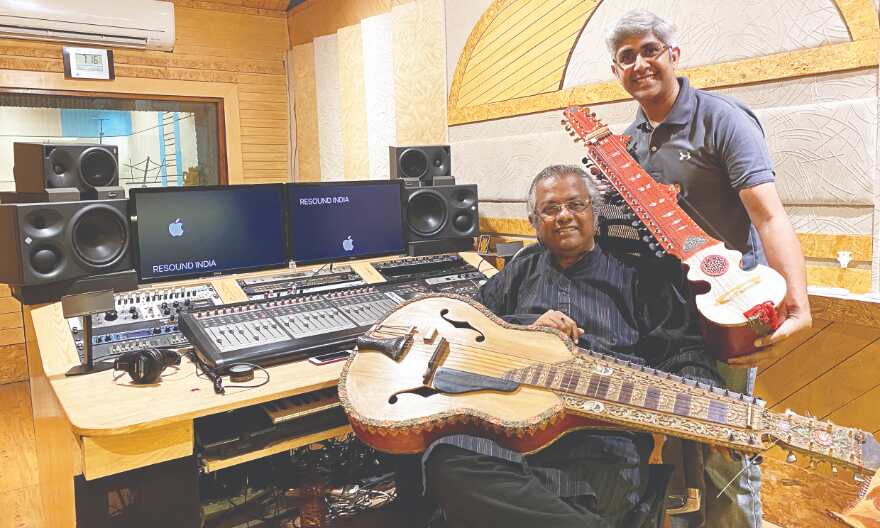Sound Matters
In an exclusive interview, Debashish Bhattacharya, Grammy-nominated renowned classical guitarist talks about his newly created instrument ‘Pushpa Veena’ and how he has been waiting for two years to sit with Sai Shravanam and experiment with him, to extract the best sound, and record some music

Last month, when it was safe to travel, Debashish Bhattacharya, Grammy-nominated renowned classical guitarist took the long trip from his native Kolkata to Chennai. The meeting was important - spending long hours with ace sound engineer and fellow musician Sai Shravanam at his state of the art equipped studio, experimenting with his newly created instrument 'Pushpa Veena' (A modified slide guitar). Bhattacharya explained, "When one makes a new instrument, he/she has to take the time to hear it intently, to hone and refine the structure to get the best sound. I created this version of the modified slide guitar nearly two years ago, but I have been wanting to sit with Sai and experiment with him, to extract the best sound, and record some music."
Especially in these days of online concerts, where the other elements of the live experience are missing, one understands the supreme importance of the quality of sound one hears. With existing instruments, the sound range is already known, so experimenting with the amplification is not such a long process, one would assume.
According to Sai Shravanam, this is not really true. "I feel Indian instruments have never been understood well sonically. For example, when one amplifies a tamboora or sitar, only one microphone is placed near the bridge. But this is not the full sound of the instrument. When you hold it and play, literally your skin can hear/feel the resonance. So many nuances are lost in reproduction. The human ear is incredible, it can catch the sound and process it from every dimension; the microphone does not have this ability. So, one has to experiment with the amplification devices. It has only been in the last 15 years or so that this aspect is gaining importance. Musicians are thinking of which mics are used, some even take their sound engineers with them to concerts to extract the best balance from the systems in place. Sadly, most auditoriums in India don't use a sound engineer."
Asking about the newly created Pushpa Veena he recorded, Sai shared, "Debashish has been wanting me to record both his instruments, 'chaturangi' and 'Pushpa Veena'. We first spoke of this about three years ago; I think it was during a concert tour in China. The recording has taken 2 days; I needed 5 mics to capture every little sound - from the sympathetic strings, body sound, base strings… When Debashish finally heard the recordings, he was so amazed, he said it's like I am sitting in front of myself playing."
Clarifying, Sai explained, "One does not really need fancy equipment, the recording studio is just a mirror. What is important is having a highly trained ear. I think only an artiste who is technically qualified or at least has an ear for true tone can handle sound."
In the younger generation, several musicians are also engaged in the business of Sound; with training in sound engineering, some are running recording, mixing and arranging studios. These include Mumbai based slide guitarist Manish Pingle, percussion exponent and Bangalore resident Pramath Kiran. In Chennai its percussionist MT Aditya Srinivasan. Most young musicians have recording studios at home; they have also invested in their own mics which they carry to concerts to ensure consistent quality; sarodist Indrayudh Majumder recalls the full day he spent in New York test studios, hearing different mics before his purchase.
The 'Sound' bar has been raised!
(Shailaja Khanna writes on music, musicians and matters of music)



